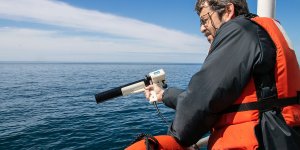Science News

A team of scientists has identified at least 11 species of fish suspected to have land-walking abilities. »

The solar minimum between Solar Cycle 24 and 25 happened in December 2019, when the 13-month smoothed sunspot number fell to 1.8, according to the Solar Cycle 25 Prediction Panel. »

Measures will likely lower rates of some diseases, but others may increase. »

Biophysicists study the formation and behavior of recently identified structures: biological condensates. »

Palaeontologists have discovered a new species of dinosaur estimated to be up to 125 million years old. »

Ocean warming is driving sea scallops, blue mussels, surf clams and quahogs into warmer waters. »

An atmospheric light show previously relegated to planets and Jupiter moons is found on comet using data from ESA's Rosetta spacecraft. »

Thermal instability drives certain California tremors. »

Invaders, pirates, warriors – the history books taught us that Vikings were brutal predators who travelled by sea from Scandinavia to pillage and raid their way across Europe and beyond. »

Materials chemists develop a durable 'leaf tattoo' to monitor soil. »

Discovery offers promise for the manufacturing of sharp-tipped structures. »

Scientists used data gathered by NASA's Cassini spacecraft during 13 years of exploring the Saturn system to make detailed images of the icy moon. »

Researchers at Texas A&M University have developed a new therapeutic from turmeric, a spice long praised for its natural anti-inflammatory properties. »

Previously overlooked yellow mealworm may serve as alternative protein. »

Grasses common in the cooler north began taking over the hot, dry southern plains. »

The asteroid shows some surprising activity on its surface, and scientists are beginning to understand what might be causing it. »

Evidence found in caves in Laos helps tell a story about a connection between the end of the Green Sahara, when heavily vegetated Northern Africa became a hyper-arid landscape, and a previously unknown megadrought that crippled Southeast Asia 4,000 to 5,000 years ago. »

A UK-led team of astronomers has discovered a rare molecule – phosphine – in the clouds of Venus, pointing to the possibility of extra-terrestrial ‘aerial’ life. »

Chip allows researchers to identify corals and symbiotic algae that live inside coral. »

Low-temperature plasma device may lead to more efficient engines, use in field medicine and beyond. »

Researchers have shown why intense, pure red colours in nature are mainly produced by pigments (...) »

Binary black hole merger likely produced gravitational waves equal to the energy of 8 suns. »

Acidification is affecting corals' ability to build their skeletons. »

In a paper, scientists at the University of Washington report evidence of a hibernation-like state in an animal that lived in Antarctica during the Early Triassic, some 250 million years ago. »

Drought more frequently affects the reproduction and survival of many animal species. »

Black carbon not as important for ice particle formation as previously thought. »

Coronavirus is able to rapidly multiply by hijacking the body and forcing it to produce more receptors it can use to enter and infect organs, a study suggests. »

Scientists need to consider the role of precipitation in an organism's ecological niche. »

Waste pickers exposed to discarded electronics, aluminium and metal cans have up to four times higher levels of the toxic heavy metal cadmium in their blood than the wider population. »

With inspiration from kirigami, engineered shoe provides grip. »

A laboratory breakthrough in cell targeting may improve the safety of cancer-killing cells. »

In a study, researchers used conservation biology and genomics to discover that the New Guinea singing dog, thought to be extinct for 50 years, still thrives. »

Researchers use deep learning to find signs present before deadly Greenland landslide. »

Spinning blue flames are potential new avenue for low-emission combustion. »

Reduced resilience of North American plant biomes could be setting the stage for mass extinctions. »

Surprisingly, stony coral sperm and eggs share similar genetic functions. »

A collaborative study has identified blood biomarkers that could help to predict which athletes need additional time to recover from a sports related concussion. »

Low-power collision detector mimics locust avoidance response. »

Supercomputer helps scientists find new features, mechanisms in tornadoes. »

Antibiotic may be a metabolic switch that affects tumor lipids. »

When a laser is fired, care must be taken to ensure it doesn't spread too thin. »

Precipitation during the "short rains" could double by the end of the century. »

Equatorial wind patterns in Antarctica reveal new connections in global circulation. »

The most massive stars in the universe are born inside cosmic clouds of gas and dust, where they leave behind clues about their lives for astronomers to decode. »

Antibiotic resistance in some kinds of bacteria may be reversed using hydrogen sulphide (H2S), according to a new study. »

Researchers use a natural plant product to coat and pin carbon nanotubes uniformly. »

Amount of sulfur up to 10 times higher than peak load during time of acid rain. »

Researchers have identified a potential new degradation mechanism for electric vehicle batteries. »

Approach enables researchers to use light to detect algae and measure key ocean properties. »

A study from the Universities of Cambridge and Melbourne has found that the onset of past climate changes was synchronous over an area extending from the Arctic to the low latitudes. »